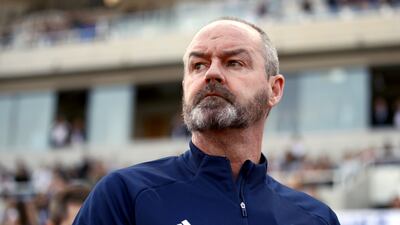Denmark attracted a host of admirers on their surge to the semi-finals of Euro 2020. With the notable exceptions of those they eliminated, if anyone was depressed by their progress it may have been Scotland.
Group F of World Cup qualifying already posed them problems. Denmark’s summer excellence then illustrated it is tougher than many had realised. Scotland dropped points against Austria and Israel in March.
Lose in Copenhagen on Wednesday and their thoughts may already turn to the play-off places as they seek to end an exile from World Cups that dates back to the 20th century. Defeat would put them seven points behind Denmark, whose last result in the pool, a 4-0 thrashing of Austria in March, served as a statement.
Denmark are, of course, still without Christian Eriksen, with Martin Braithwaite another prominent absentee but the summer showed their strength in depth. The days when they were deemed a one-man team ought to be consigned to the past.
And in the grand tradition of Scottish lucklessness, they now find themselves pitted against one of the world’s best sides at a point when they are short-staffed themselves. After left-back, courtesy of Andy Robertson and Kieran Tierney, midfield tends to be their strongest department. Now Scott McTominay and Stuart Armstrong are injured while John McGinn and the right-back Nathan Patterson are self-isolating.
The Aston Villa vice-captain can assume an added importance for a team that lack prolific scorers. McGinn has been Scotland’s top scorer in both Euro and World Cup qualifying. His impact is such that even the captain Robertson admits his son’s favourite player is McGinn.

Coronavirus disrupted Scotland’s Euro 2020, with Billy Gilmour sidelined after his man-of-the-match display against England. Now another ill-timed positive test could come at a further cost. Even the coaching staff has been disrupted with Austin MacPhee missing: Steven Naismith has now got a first call-up to join Steve Clarke’s backroom staff, though Scotland may wish they could persuade a former talisman to bring his boots. With 10 international goals, Naismith has six more than any of their current forwards.
Clarke has adopted an uncomplaining approach, pragmatically rationalising that he can call upon others. Yet if there are many reasons why Scotland failed to reach 10 consecutive major tournaments before Clarke piloted them to Euro 2020, a lack of consistent, high-class scorers figures near the top of the list.
Strikers Lyndon Dykes and Che Adams had 13 shots between them in the summer, but only four were on target and none went in. Scotland got one goal in Euro 2020, courtesy of the midfielder Callum McGregor. Denmark had seven different scorers. If McGinn has been their Eriksen, Scotland must wish they had an equivalent of Kasper Dolberg or Mikkel Damsgaard.
Scotland’s return to action is without David Marshall, the goalkeeper whose penalty saves secured qualification for Euro 2020 but who provided the abiding image of their tournament when he flew into the net in a failed attempted to keep out Patrik Schick’s 49-yard shot.
Now third choice for Derby, he has been dropped. If it was a reminder their resources are meagre in some areas, their Euro 2020 exit prompted them to vow it would not be another 23 years before they returned to a major tournament. As Robertson said then, it had to be “the start of a wonderful journey rather than the end.”
Now there is the danger that next week’s game against Austria becomes bigger, determining the likely second-place finisher and thus who will enter the play-offs. Unless Scotland, whose summer peaked with that draw against England, can upset another Euro 2020 achiever to retain hope of taking the direct route to Qatar.


